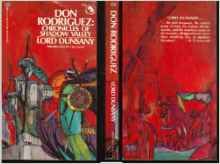Marc Aramini on Classics, Critics, the New Wave, and Seventies Culture
Monday , 30, May 2016 Appendix N 3 Comments Spacefaring, Extradimensional Happy Kittens has an excellent interview with Marc Aramini up today. It’s wide-ranging, covering how Marc’s book on Gene Wolfe’s stories came to be, why people would want to read Wolfe in the first place, and how Aramini’s criticism has received a dearth of acknowledgement in the wider scene.
Spacefaring, Extradimensional Happy Kittens has an excellent interview with Marc Aramini up today. It’s wide-ranging, covering how Marc’s book on Gene Wolfe’s stories came to be, why people would want to read Wolfe in the first place, and how Aramini’s criticism has received a dearth of acknowledgement in the wider scene.
There’s a lot of great stuff there, but I wanted to home in on the one question that seems to have cropped up the most over the past year or so in these parts– the nature of the culture shift that began in 1977 and then steadily grew into an observable generation gap within the science fiction and fantasy scene:
Do you share the opinion that contemporary SFF is in general not as good or interesting as it used to be? If so, do you think it has to do with the poetics of the field or rather with larger-scale aesthetic/ideological/etc. shifts in society?
I actually enjoy the grittier turn in recent fantasy literature, and appreciate more surrealistic techniques in fiction. At the risk of sounding older than I am, I do think that turning away from a classical education born of tradition may have hampered the depth and richness of much serious writing, because I ascribe to the now almost controversial belief that good fiction says something universal about the human condition, regardless of who and where we are, and that it is worthwhile to engage with that tradition or we risk forgetting something important about humanity as a whole, where we have been and why we made the choices that we did.
Thus, I applaud the turn to literary, symbolic, and complex themes in SF, but am a bit saddened by the loss of our ability to appreciate narratives that seem out of date or don’t jive with our current agendas. The American and English SF and Fantasy of the 1970s almost seems as if it came from a completely different culture in hindsight. For example, the criticism of Wolfe that I most frequently see involves his treatment of women and their hyper-sexualization, but I have also read that writers like Henry Miller were considered “feminists.” Miller’s tone towards women is extremely object oriented and vulgar, and almost entirely sexualized. I can’t imagine a woman like Maytera Mint from Book of the Long Sun in his work.
I haven’t found the unique eccentric voices in modern SF that writers like Lafferty, Cabell, E.R. Eddison, Mervyn Peake, and Dunsany naturally had, but I think the New Wave was a definite step in the right direction. I don’t necessarily think that that movement’s bold experimental emphasis on style and form has been continued in the field today, but I don’t read as widely as I should in it.
Oh, that’s good stuff there: The American and English SF and Fantasy of the 1970s almost seems as if it came from a completely different culture in hindsight. I don’t think you can take a serious look at even just the role-playing games of that period without coming to the same conclusion.
Most new wave stuff was self-indulgent and dated quickly, if anything there’s too much of that now. How many awards are given to stories built on literary gimmicks that impress only the author and a closed circle of critics?
I’d just like to thank you personally and Castalia House for this series on Appendix N. I just started listening to an audiobook of Tarzan of the Apes recently. I doubt I ever would have otherwise because the derivative fifth-hand material I’ve seen these days just doesn’t seem that interesting. I’m about a quarter of the way in and I am completely stunned at how much I am enjoying this book.
Thank you again.